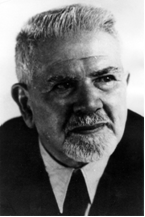 The website is in construction. New files will be uploaded as soon as they are available.
The website is in construction. New files will be uploaded as soon as they are available.
EMANUEL BEKE
Pàpa, 24 April 1862 -Budapest, 27 June 1946

Brief scientific biography
Beke began his studies at the Technical University of Budapest but soon switched to the University of Budapest. He obtained his teacher's diploma in 1883 and his doctorate in 1884. He taught at a secondary school in Budapest until 1895. Thanks to a scholarship, Beke was able to study during the year 1892/93 in Göttingen, where he participated in the mathematics seminar and became known to Felix Klein. He became interested in Klein's activities for reforming the teaching of mathematics, and after his return to Budapest he worked actively to reform mathematics teaching in Hungary, applying Klein's conceptions. In 1895 he started teaching at the Mintagimnàzium (Gymnasium, Budapest, Trefort Street). In 1900 he was appointed professor at the University of Budapest. He became a corresponding member of the Hungarian Academy of Sciences in 1914. After World War I, the Council of the University started began a disciplinary investigation against him because of his political activity, and in 1922 he was stripped of his position at the university and his membership in the Academy. Consequently, Beke began working for a publisher. His book on Differential and Integral Calculus (1910, 1916) became the textbook of reference for several generations of mathematics students. His major areas of scientific interest were linear differential equations, determinants, problems from physics, and the teaching of mathematics.
In 1951 the Hungarian Bolyai Jànos Mathematical Society inaugurated the Beke Manó (Emanuel) Prize for outstanding results in teaching and popularization of mathematics.
Commitment to education
Between 1906 and 1909 Beke was the chairman of the Commission to reform the teaching of mathematics in secondary schools in Hungary. In 1909, as one of the three delegates from Hungary, he became a member of IMUK. In the series of national reports on the state of mathematics instruction in Hungary, Beke wrote the report on the secondary schools (1910).It was Klein who had chosen Beke as the organizer and coordinator of the international survey on the results of the introduction of the elements of the differential and integral calculus into secondary schools. His report, which was presented at the IMUK meeting 1914 in Paris, addressed one of the most essential concerns in Klein's reform program.
Primary bibliography
E. BEKE, 1898, A homogén lineàris differenciàlegyenletek rezolveseinek alapegyenleteiröl, Math. Termtud. értesítö XVI, 407-420 [in Hungarian].
E. BEKE, 1900, Tipikus hibàk a matematika tanítàsàban, Magyar Paedagógia I) X.9, 520-530 [Typical errors in mathematics instruction; in Hungarian].
E. BEKE, 1906, Bevezetés a differenciàl és integràlszàmítàsba (with later editions in 1920, 1965, 1967) [ Introduction to Differential and Integral Calculus; known as the "little Beke"; in Hungarian].
E. BEKE, 1909, Über den jetzigen Stand des mathematischen Unterrichtes und die Reformbestrebungen in Ungarn, In: G. Castelnuovo (ed.), Atti del IV Congresso Internazionale dei Matematici 1908. Vol. III (Roma: Accademia die Lincei, 1909), 530-533.
E. BEKE AND S. MIKOLA, 1909, A középiskolai matematikatanítàs reformja, Franklin, Budapest [The reform of mathematics teaching in secondary schools; in Hungarian].
E. BEKE, 1910, Differenciàl és integràlszàmítàs, I-II, Budapest (with a second edition in 1916) [in Hungarian; Differential and Integral Calculus; known as the "big Beke"].
E. BEKE,1914, Les résultats obtenus dans l'introduction du calcul différentiel et intégral dans les classes supérieures des établissements secondaires, L'Enseignement Mathématique 15, 245-306.
E. BEKE, 1925, Determinànsok, Atheneum. Budapest [Determinants; in Hungarian].
Author
Gert Schubring
Institut für Didaktik der Mathematik
Fakultät für Mathematik, Universität Bielefeld
gert.schubring@uni-bielefeld.de
Tünde Kàntor,
Debrecen University
Mathematics Department – Ungary
tkantor@math.ktle.hu
